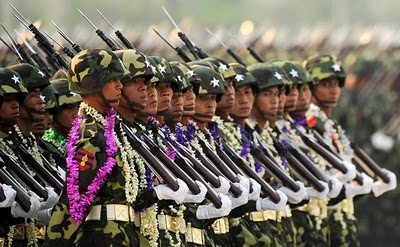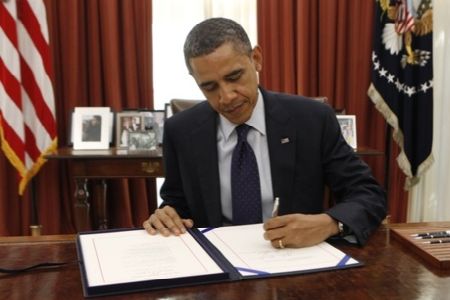Myanmar’s nominally-civilian president sought to reaffirm the status of the country’s military on Wednesday, giving credit to the army and the former junta for recent political reform gestures.
On the country’s independence day former general Thein Sein stressed the importance of Myanmar’s “Tatmadaw” military, which relinquished direct control over the impoverished nation last year after controversial elections.
“It was the Tatmadaw that directed the nation towards building a peaceful, modern and developed democratic one,” he said in a message read by Vice President Sai Mauk Kham to mark the commemoration of independence from Britain.
The army “took step-by-step measures for writing a constitution in order to practise multi-party democracy,” he added.
The anniversary of Myanmar’s independence in 1948 has traditionally been used by the ruling generals to warn of dangers posed by other nations and to rail against “evil colonialism”.
In remarks mirroring those made by junta strongman Than Shwe in previous years, Myanmar’s new leader credited soldiers for uniting the country, which has suffered decades of civil war between the military and various armed ethnic rebel groups.
And he insisted the army will remain an essential pillar of the country.
“A Tatmadaw of international standard is required for national defence,” said the statement, delivered to a crowd of around 3,000 ministers and civil servants gathered in the capital Naypyidaw.
Thein Sein blamed “disturbances” in 1988 — the year of a failed student uprising that saw the emergence of Aung San Suu Kyi and her pro-democracy movement — for leaving the country in “ruin”.
He did not mention the economically disastrous rule of military dictator Ne Win in the preceding decades.
But there were elements of the more reformist tone that has marked his leadership, which has included dialogue with Suu Kyi, suspending an unpopular Chinese-backed mega dam and reaching out to the international community.
“Myanmar is marching towards a new modern, developed nation enlisting the strength of human resources like intellectuals,” he said.
The state mouthpiece The New Light of Myanmar, which referred to the junta as “authoritarian” on Tuesday, ran the statement in full.
It also published a comment piece insisting the new leaders would “never turn back” from reforms.
“Hence, the Myanmar government can daringly disclose that there is no way to deviate from its democratic transition,” it said.











